|
|
|
Sort Order |
|
|
|
Items / Page
|
|
|
|
|
|
|
| Srl | Item |
| 1 |
ID:
181532
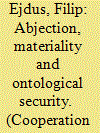

|
|
|
|
|
| Summary/Abstract |
Ontological security scholarship in International Relations (IR) has predominantly focused on the importance of social environments for the healthy sense of self. However, material environments can also provide an important source of ontological security. In my previous work I have argued that to assume this role of ‘ontic spaces’ material environments need to be discursively linked to states’ self-identity either through projection or introjection. In this article, I draw on the work of Julia Kristeva to argue that ontic spaces can also come about through abjection or the rejection of a material environment from the narrative of the self. I illustrate this theoretical point in the case study of the Serbian Orthodox Church of Christ the Saviour in Pristina. Its construction began in 1992 during the rule of Slobodan Milošević but was never finished due to the Kosovo war in 1998/9. Over the years, as all proposed changes are considered to be a threat to a healthy sense of self of either Serbs or Albanians, the building has been turned into an abjected ontic space, an ambiguous symbol undermining the self/other and victim/oppressor boundaries and as such both repels and attracts, threatens and protects.
|
|
|
|
|
|
|
|
|
|
|
|
|
|
|
|
| 2 |
ID:
181531
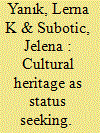

|
|
|
|
|
| Summary/Abstract |
This article explores the relationship between cultural heritage politics and international status-seeking. We advance a two-fold typology of status-seeking that explains why states engage in cultural heritage restoration practices at home and abroad. First, cultural heritage restoration can be an easy way to signal state respect of its multicultural past while providing cover for continuing anti-multicultural policies of the present. States with uncertain, challenged, or liminal international status use cultural heritage projects as a ‘standard of civilization’ of democracy, displaying themselves on the international stage as worthy of status and respect. Cultural heritage here is used as a strategy for international status affirmation. Second, states may engage in cultural heritage restoration beyond their borders, supporting or directly managing renovation of these sites in order to expand their imagined national cultural, political, and economic domain. Cultural heritage restoration projects here serve as a backdrop for powerful international economic alliances that can be used for status substitution—replacing one status-generating benchmark of ‘standard of civilization’ with another—economic prosperity. We illustrate these arguments with two recent cases of cultural heritage restoration that involve Turkey: the ‘Akdamar’ Church in Van, Turkey and the Tomb of Gül Baba in Budapest, Hungary.
|
|
|
|
|
|
|
|
|
|
|
|
|
|
|
|
| 3 |
ID:
181533
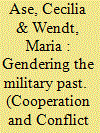

|
|
|
|
|
| Summary/Abstract |
This article showcases how a feminist perspective provides novel insights into the relations between military heritage/history and national security politics. We argue that analysing how gender and sexualities operate at military heritage sites reveals how these operations dis/encourage particular understandings of security and limit the range of acceptable national protection policies. Two recent initiatives to preserve the military heritage of the Cold War period in Sweden are examined: the Cold War exhibits at Air Force Museum in Linköping and the redevelopment of a formerly sealed off military compound at Bungenäs, where bunkers have been remade into exclusive summer homes. By combining feminist international relations and critical heritage studies, we unpack the material, affective and embodied underpinnings of security produced at military heritage sites. A key conclusion is that the way heritagization incorporates the ‘naturalness’ of the gender binary and heterosexuality makes conceptualizing security without territory, or territory without military protection, inaccessible. The gendering of emotions and architectural and spatial arrangements supports historical narratives that privilege masculine protection and reinforce a taken-for-granted nativist community. A feminist analysis of military heritage highlights how gender and sexualities restrict security imaginaries; that is, understandings of what is conceivable as security.
|
|
|
|
|
|
|
|
|
|
|
|
|
|
|
|
| 4 |
ID:
181535
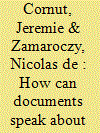

|
|
|
|
|
| Summary/Abstract |
Practice theorists favor interviews and participant observations in their study. Using insights from anthropological works on bureaucratic texts, in this article we develop methodological tools to complement these interpretive methods of data collection. We suggest a way to trace practices by systematically looking through both the content of documents and their form. We probe this approach with an analysis of 408 diplomatic cables sent by the US Embassy in Dar es Salaam, Tanzania in 2005–2009 and subsequently released by Wikileaks. We draw on these documents to tell two related stories about diplomatic practices: the first about epistemic practices and how the cables privilege certain voices and types of knowledge over others, and the second about diplomatic culture, where the cables serve as evidence of the powerful socialization processes that diplomats are subject to. This contributes to International Relations (IR) with a new approach for systematically analyzing written documents to uncover international practices.
|
|
|
|
|
|
|
|
|
|
|
|
|
|
|
|
| 5 |
ID:
181534
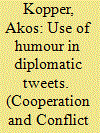

|
|
|
|
|
| Summary/Abstract |
Today diplomacy increasingly relies on tweets. Yet, as tweets only allow for 280 characters, statements must be brief and impactful, which encourages the use of humour in conveying one’s message. This article scrutinizes irony and ridicule in diplomatic interactions. Even though these forms of humour may antagonize parties and even turn issues into a security concern, this article points out that they also have an affiliative aspect and could play a conflict-mediating role. Because humour, especially irony, is easy to misunderstand (especially in cross-cultural settings), many warn against using them in diplomatic exchanges. Nevertheless, I will argue that they are ideal for expressing multi-layered messages, enabling the speaker to rely on what is often called ‘constructive ambiguity’, which is often useful in diplomatic conduct. Two case studies illustrate the argument. The first focuses on cartoons ridiculing President Wilson in the early 20th century for his reluctance to commit the US to join WWI (suggesting that cartoons of the time might be predecessors of today’s tweets), and the second on tweets published by the British Embassy in London apropos of the Skripal case (offering an example how humorous tweets can convey multi-layered, complex messages).
|
|
|
|
|
|
|
|
|
|
|
|
|
|
|
|
| 6 |
ID:
181536


|
|
|
|
|
| Summary/Abstract |
International Relations scholars and practitioners commonly agree that relationships in world politics are managed impersonally. Personal connections between agents of states are perceived as having only little impact on foreign policy of states. The current article challenges this impersonal ethos, suggesting that personal relationships play an important role in conducting, and thus understanding, interstate relations. Interviews conducted with 21 senior Israeli officials concerning mundane professional practices reveal three elements that are essential for successful statecraft: acknowledging the power of interpersonal relations; substantive knowledge of counterparts; and the excellent communicative competencies needed to realize the potential of personal connections. We argue that statespersons’ behavior can be located on an impersonal-interpersonal continuum. Furthermore, we suggest explanations for deviations from the impersonal ethos and discuss the role of interpersonal practices in managing interstate relations. At the very least, the personal aspect should be taken into consideration when examining foreign policy. However, personal relations may have a highly significant impact on interstate interactions, thus requiring a revision of the current paradigm in IR, which marginalizes the personal aspect.
|
|
|
|
|
|
|
|
|
|
|
|
|
|
|
|
|
|
|
|
|